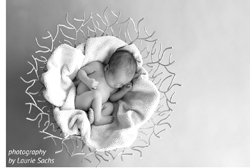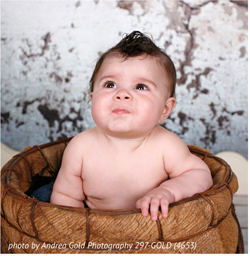FAMILY - BABY LOVE
Best for Baby's Health
September, 2012 - Issue #95
 |
Antelope Valley Hospital has been selected to participate in Best Fed Beginnings, a first-of-its-kind national effort to significantly improve breastfeeding rates in states where rates are currently the lowest. According to the Centers for Disease Control and Prevention (CDC), although breastfeeding is one of the most effective preventive health measures for infants and mothers, half of US-born babies are given formula within the first week, and by 9 months, only 31 percent of babies are breastfeeding at all. Best Fed Beginnings seeks to reverse these trends by dramatically increasing the number of US hospitals implementing a proven model for maternity services that better supports a new mother's choice to breastfeed. The National Initiative for Children's Healthcare Quality (NICHQ) is leading the effort through a cooperative funding agreement with the CDC, and will be working closely with Baby-Friendly USA, Inc. "Antelope Valley Hospital is delighted to have been chosen to participate in this important effort and to have the opportunity to improve our maternity care services to better support breastfeeding," said Edward Mirzabegian, AVH chief executive officer. "We recognize that for women who plan to breastfeed, the hospital experience strongly influences a mother's ability to start and continue breastfeeding. We are committed to implementing evidence-based care through the Baby-Friendly designation process. This will ensure that mothers delivering in our facility who intend to breastfeed are fully supported."
Breastfeeding has multiple health benefits for both infants and mothers. For infants, it decreases the incidence and severity of many infectious diseases, reduces infant mortality and optimally supports neurodevelopment. It also decreases infants' risk of becoming obese later in childhood. For mothers, breastfeeding decreases the risks of breast and ovarian cancers, diabetes, rheumatoid arthritis and cardiovascular disease.
949-5000 www.avhospital.org
 |
Within one week of opening its doors on June 4, Henry Mayo's 11-bed neonatal intensive care unit (NICU) welcomed five tiny babies.
The completion of the $6 million state-of-the-art facility is an important part of the hospital's expansion and vision to create the ideal patient-centered healthcare environment for Santa Clarita Valley's tiniest patients. The new 4,369-square-foot NICU has the capacity and technology to treat the community's tiniest patients. The NICU is staffed by a specialized, multidisciplinary team of healthcare professionals with a combined experience of 400 years. Neonatal nurses and respiratory care specialists, nutritionists, social workers, pharmacists, physical and occupational therapists provide support for the newborns and their parents.
With private rooms, parents can interact and bond with their babies in a home-like environment, according to NICU Medical Director Sukshma Sreepathi, MD. Dr. Sreepathi, a board- certified neonatologist, oversees the care, with the help of nurses who have advanced training in handling the premature births. "Often times we need the full attention of a nurse in caring for a baby," Dr. Sreepathi said. "In general we maintain a ratio of one nurse in the care of two babies. Depending on how premature the baby is, a newborn's stay at the NICU can range from three days to three months." Dr. Sreepathi believes that the babies should be provided the best care possible and sent to their homes to thrive with their families as soon as the situation permits.
NICU Safety "Quick Facts":
• Between patients, it takes four hours to clean one NICU isolette.
• Everyone who enters the NICU must wash their hands with soap and water for at least two minutes.
• Visitors must remove all rings, bracelets and watches before hand washing and those items must not be worn when in the NICU.
• Visitors must complete a health screening questionnaire every 24 hours.
253-8000 www.henrymayo.com
Common Newborn Peculiarities and What to Do about Them
Newborn babies up to 2 months are different from older infants. They snort, twitch, develop spots that come and go, spit up milk and sometimes even blood, and generally find ways to make parents, particularly first-time parents, crazy. They are also medically different from older babies. A 6-month-old with a fever is most likely not seriously ill; a newborn with a fever must be treated as though there is a serious problem until proven otherwise. Here are a few issues peculiar to newborns.
Pimples on the Face, Forehead, Neck & Shoulders (Infant Acne)
Around 1 month of age, red bumps with a small amount of yellow or white material appear on the face and may spread to the rest of the head, the neck or the shoulders. Although this outbreak often looks worse when the baby has been warm, such as after a nap or a bout of crying, it is not, strictly speaking, a heat rash. It is called "infant acne" because it resembles the pimples of adolescent acne. It always seems to be at its worst just when relatives come over to see the new baby! There is no treatment for infant acne except time. It will go away in a month or two and will leave no scars. It is normal to have acne on the face and chest from 1 month until 2 or 3 months of age. Call your pediatrician if loose, large yellow blisters or pimples elsewhere on your baby's body are present; it may mean there is a skin infection.
Breast Lump with or without Discharge
Female hormones that stimulate a mother's breasts to enlarge and produce milk are transferred from mother to baby during pregnancy, so many babies - male as well as female - are born with lumps of enlarged breast tissue underneath their nipples. In some babies this is no more than a little nubbin on one side that can be felt but not seen, while other babies may have large lumpy breasts on one or both sides.
Breast lumps do not occur in premature babies; in fact, they are one of the signs your pediatrician looks for on the first examination after birth to make sure your baby was born at full term. It's normal for your full-term baby to have breast lumps and discharge for about two months after birth. Call your pediatrician if there is any redness around the nipple or the discharge looks like pus or blood. On rare occasions, breast lumps can become infected.
Tips courtesy of Valencia Pediatric Associates
294-2229 www.valpeds.com
 |
Facey pediatrics may be part of a large medical group, but you'd never know it. Each location feels like a small pediatric office, complete with a warm team of medical professionals who really listen to your concerns. Facey's pediatric teams work diligently to schedule office visits, same-day urgent appointments with your child's pediatrician and appointments with specialists. Convenient urgent care centers and after-hours on-call physicians are always available to ensure that you and your child are well taken care of, no matter the hour. But it doesn't stop there! With Facey, you get the best of two worlds: A caring, comfortable setting matched with superior technology. A state-of-the-art electronic medical record system keeps your child's health information organized and easily accessible. It sends your prescriptions directly to the pharmacy of your choice, saving you time and worry. And you can even manage appointments, test results and more from the comfort of your own home with the new online service, FaceyConnect. This comprehensive approach to care is the foundation of a long-term, rewarding relationship that provides relief and comfort to both child and parent alike. And since Facey Medical Group accepts most health insurance plans, the choice is simple if you are looking for convenient and innovative health care solutions. To learn more about Facey's pediatric services, visit
www.facey.com/peds today.
Affordable Care for You and your Family
Even if You don't have Health Insurance
The Northeast Valley Health Corporation (NEVHC), with two centers in Santa Clarita, provides high-quality pediatric, OB/GYN, reproductive health, case management, nutrition counseling and other vital services to keep you and your children healthy. Through their programs and services, preventable diseases are drastically reduced and the worry individuals and families experience about where they can receive health care is no longer necessary.
Their Women, Infant and Children (WIC) Program is available for women and children ages 0 to 5. The WIC Program helps pregnant and postpartum women and children eat well and stay healthy. If eligible, special checks are issued to buy healthy foods such as fruits, vegetables, whole grain foods, eggs, milk, cheese and baby food. Call the WIC hotline to see if you qualify at 800-313-4WIC (942).
Go online or call to learn more about the primary and preventive care available to you; health coverage plans; payment options; and the local health centers, along with info about the specific programs they offer to support well-being. Northeast Valley Health Corporation brings people together to offer improved health, continuity of care, a better quality of life and hope for a better future.
Northeast Valley Health Corporation 705-2040 www.nevhc.org
|
||||||||||||||||||||||||||||




